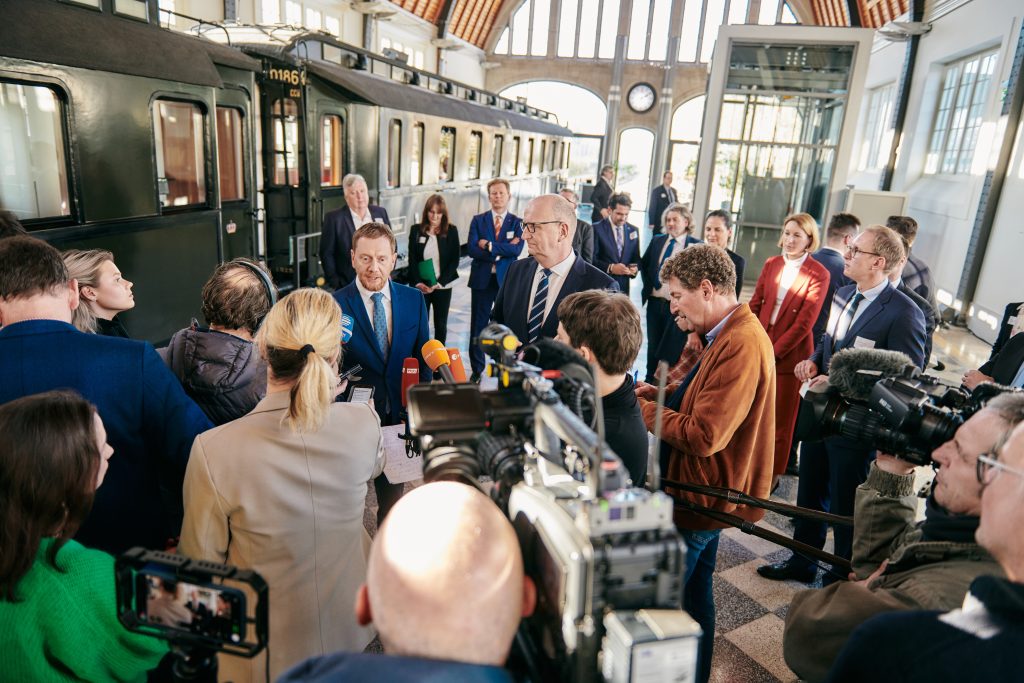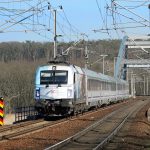 Deutsche Bahn and PKP Polskie Linie Kolejowe discussed on the development of German-Poland cross-border rail connections during a rail summit held in Potsdam.
Deutsche Bahn and PKP Polskie Linie Kolejowe discussed on the development of German-Poland cross-border rail connections during a rail summit held in Potsdam.
The two sides intend to build new railway lines including the extension of Szczecin – Berlin route. For a journey time of 90 minutes between Berlin and Szczecin, the route between Angermünde, in Brandenburg, and the German-Polish border is currently being double-tracked, electrified, and equipped with the ETCS train control system. From 2026, local trains from the German capital to the Polish Baltic Sea will be half an hour faster than today.
Another project covers the construction of a new railway bridge over the Oder river conneting Küstrin-Kietz, in Brandenburg, at the Polish border and Kostrzyn, a town in Gorzów County, in western Poland.
DB and PKP PLK intend to deliver better connections and services for long-distance transport on the Berlin – Frankfurt (Oder) – Kraków – Przemyśl (in southeastern Poland, near the border with Ukraine). Currently, a pair of trains are running each day and in the future, the companies intend to increase the daily traffic to two trains in each direction.
Arnold Bresch, member of the Management Board of PKP Polskie Linie Kolejowe presented the progress of the works on the route Szczecin Główny – Szczecin Gumieńce – state border. It was also announced at the meeting that a two-hour cycle is planned for the Berlin – Poznań – Warsaw long-distance line with six pairs of trains a day from June 2023.
The summit also addressed the issue of Polish-German cooperation to support Ukrainian citizens and Ukrainian Railways (Ukrzaliznytsia). The Polish side highlighted that from the outbreak of the war to the end of June 2022, over 2 million Ukrainian citizens took advantage of free travel in the country. In addition, the role of the Polish railway sector in the transport of Ukrainian grain was also emphasized.
When the was in Ukraine started, “we have been in close contact with our partners at the PKP to identify the way we can help. We are cooperating on the rail bridge, which has been used to bring humanitarian supplies directly to war-affected areas since March 2022. Together, DB and PKP ensured that hundreds of thousands of people were able to leave the war zones safely. Half a million refugees have used our helpukraine ticket,” Richard Lutz the CEO of Deutsche Bahn said. helpukraine ticket is issued by Deutsche Bahn to refugees via Germany’s federal states. It is designed as an unbureaucratic way to quickly and easily help refugees from the war in Ukraine.
To develop German-Poland cross-border rail links in 2022 PKP PLK awarded a EUR 1.9 million contract for design documentation for the electrification and the construction of the double-track on the Szczecin Główny – Szczecin Gumieńce – state border route. The construction is expected to start in 2024 and also includes three new passenger stops and a new station in Kołbaskowo, a village in West Pomeranian Voivodeship, north-western Poland, near to the border with Germany, and the construction of
In November 2022, DB launched the works on Berlin – Szczecin railway, known as Stettiner Bahn or Stettin Railway. The works will be carried out from Angermünde to the Polish border and the line section between Doberlug and Kirchhain are being upgraded to achieve greater capacities in rail transport.
The upgraded line between Angermuende and the German-Polish border is of great significance for European rail transport. The section between Passow and the German-Polish border is 30 km long. This section will also be double tracked and electrified to increase the speed from 120 km/h to 160 km/h which will provide greater capacity.
The project is broken down into two planning approval sections covering the first 19 km section between Angermuende and Passow and the second 30 km section connects Passow–Tantow–state border. The project also includes the replacement of six rail overpasses and the renewal of five stations (Passow, Casekow and Tantow stations and Schoenow and Petershagen stops).
The Stettin Railway connects the Berlin-Brandenburg metropolitan region with the German-Polish border before continuing to Szczecin (Stettin) on the Polish side. As the gateway to the Baltic Sea, the Szczecin port city is an important hub between Scandinavia, the Baltic States and Central Europe, and the rail line between Germany and Poland is important for European freight traffic. Under the Strong Rail strategy, DB AG is making the 49-km line section between Angermuende in Brandenburg and the German-Polish border fit for the future traffic demand. On the Polish side, PKP PLK is modernising the remaining 10 km to Szczecin.
Share on:






